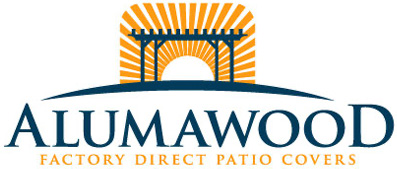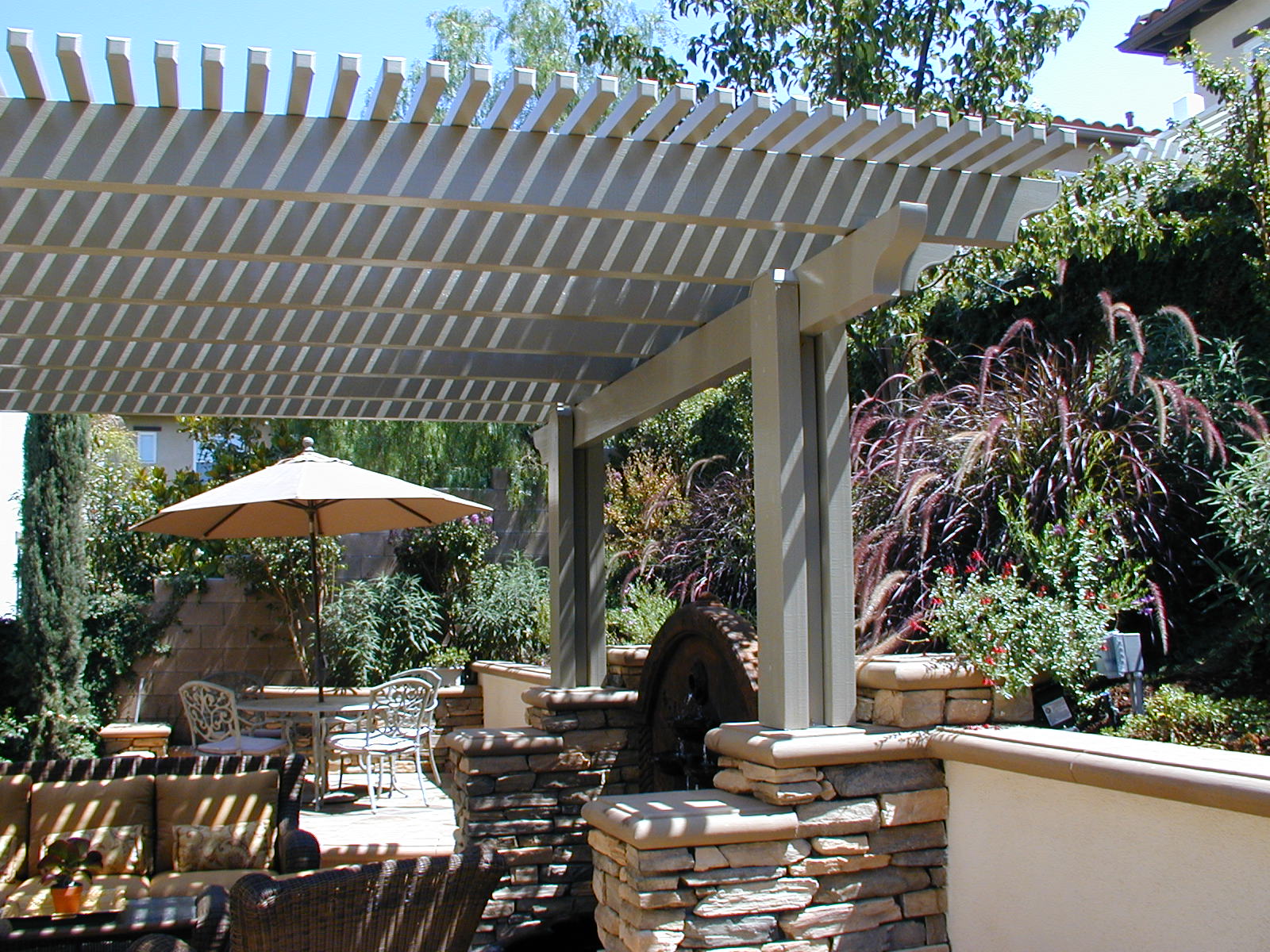When deciding whether vinyl or aluminum is a better material for your patio cover, various factors must be considered, including design compatibility, maintenance requirements, cost, and durability. Each material has pros and cons that might make it more suitable for specific applications and personal preferences.
Design Compatibility
Vinyl:
Vinyl products might not blend well with more traditional or natural settings. Vinyl has a more synthetic appearance, which might clash with a backyard’s natural elements, such as trees, plants, and other landscaping features. This material is also less flexible in design since it cannot be painted or easily customized once installed.
Aluminum:
Aluminum patio covers offer more versatility in design. Modern aluminum products, such as those with wood grain finishes like Alumawood, can mimic the look of natural wood, making them suitable for both traditional and contemporary homes. Alumawood can be refreshed with a coat of paint and customized to match or complement the existing colors and styles of your home’s exterior, fencing, hardscape, and pool areas. This flexibility allows aluminum to integrate seamlessly into various architectural styles, including transitional designs that blend traditional and modern elements. The Equinox Louvered roof system pergola, with its sleek square-edged extruded aluminum beams, gutter, and posts, takes the contemporary style to the furthest extent and can easily control the atmosphere in the home’s interior, which cannot be duplicated with vinyl.
Maintenance Requirements
Vinyl:
Vinyl patio covers are low maintenance compared to wood but can have drawbacks. They can warp under extreme heat, especially in areas with hot summers. Additionally, while vinyl is durable, it can become discolored over time due to exposure to UV rays, and you cannot paint over it to refresh its look. Cleaning is relatively simple, but the material can develop a chalky residue that requires more frequent washing to maintain its appearance.
Aluminum:
Aluminum covers require minimal maintenance. They do not warp, peel, rot, or crack, and modern aluminum products are often treated with a siliconized paint system that enhances their durability and appearance over many years without needing repainting. When it comes to cleaning, aluminum is generally easier to maintain, as it does not develop the same kind of residue as vinyl. The ability to repaint aluminum allows homeowners to update their patio cover’s look as their home’s color scheme evolves.
Cost Considerations
Vinyl:
Vinyl patio covers tend to be more expensive upfront than aluminum ones. While vinyl is a lifetime product, people often replace it before it reaches its entire lifespan due to issues like warping, discoloration, or simply because it looks outdated, which can add to the long-term costs, making it less economical than it might appear initially.
Aluminum:
Aluminum patio covers are typically more cost-effective in terms of initial investment and over the long term. They offer a balance of affordability and durability. With options like Alumawood, homeowners can achieve a high-end look without the high-end price. Aluminum’s durability means it doesn’t need frequent replacement, and its ability to dissipate heat better than vinyl can add to its longevity and comfort. The Equinox louvered pergola patio cover is half the cost of the competing louvered patio cover companies. Its dual-cell two-sided louver can span up to 14′, whereas others cannot with single-cell technology.
Durability and Longevity
Vinyl:
Despite being advertised as low maintenance, vinyl can have several durability issues. Warping from heat and discoloration from UV exposure are significant concerns. These issues can compromise the patio’s appearance and structural integrity over time.
Aluminum:
Aluminum patio covers, especially those made from high-quality, thick-gauge aluminum like Maxxwood, are highly durable. They can withstand harsh weather conditions without deteriorating. Unlike vinyl, aluminum does not warp, rot, or become discolored. The structural components of aluminum patio covers are also more robust, providing better support and stability.
Conclusion:
Choosing between vinyl and aluminum for a patio cover ultimately depends on your priorities and tastes. If you value low maintenance and are willing to invest in a material that might need to be replaced sooner due to wear and tear, vinyl will be a suitable option. However, aluminum is likely the better choice if you prefer a more versatile, durable, cost-effective solution that offers many design possibilities. Aluminum patio covers offer a balance of aesthetic appeal, durability, and cost-efficiency, making them adaptable for various home styles and climates. Their ability to blend with traditional, modern, and transitional designs, with low maintenance needs and long-term durability, often makes aluminum the preferred choice for many homeowners.

